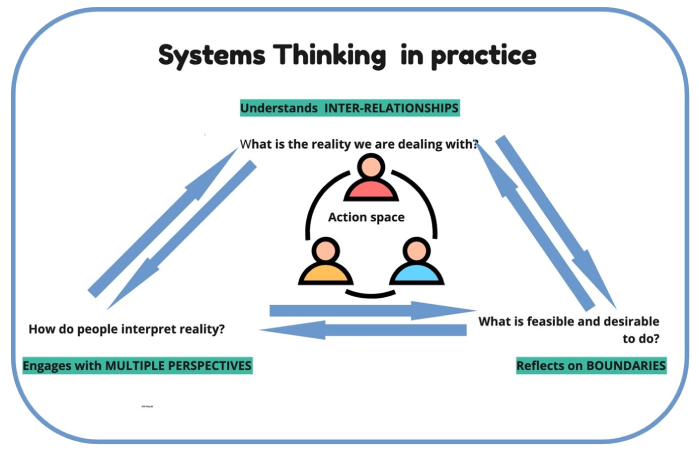About
Systems Thinking
Sometimes you know that something is wrong and needs to change, but agreeing on what exactly the problem actually is, can be tricky. You are stuck, the situation is stuck and taking action in one sphere seems likely to cause harm elsewhere. Systems thinking provides a way to structure complex situations, without jumping into solutions too quickly. This creates enough space to support an exploration of the interrelationships, multiple dependencies and perspectives at play.
Interrelationships, multiple perspectives and boundaries for systems practice (based on the work of Martin Reynolds and Bob Williams)
Understanding relationships is about looking at what happens between people and processes and asking “what is the reality we are dealing with here?” Engaging with multiple perspectives starts with an exploration of how different stakeholders interpret reality, while reflecting on boundaries is about who and what is included or excluded in this situation. Boundary reflections also call for pragmatic decisions about what is feasible and desirable to do.
Ultimately unsticking systems is about creating shared purpose and flow so that the “dance with systems” - as Donella Meadows described it - can continue in the right direction, rather than continuously producing outcomes that nobody wants.
As a discipline, Systems thinking has its roots in cybernetics and has evolved from a consideration of feedback mechanisms to understanding the self-organising nature of dynamic organic systems. It draws on multiple disciplines including engineering, biology, mathematics, sociology, philosophy and psychology.
“The purpose of a system is what it does. There is after all, no point in claiming that the purpose of a system is to do what it constantly fails to do.”
Systems Being
Over time, Systems thinkers have developed more sophisticated ways of challenging defensive thinking routines and encouraging inside-out purposeful action within systems so that they can serve their stated purposes more effectively. While defensive reasoning is encouraged in many organisations and institutions, this is at odds our human desire to be a force for positive change in the situations we are engaged in. Systems Being supports the journey towards deeper engagement with personal purpose, and prompts deeper questioning of who you are at this moment in history and what your contribution is, both at a personal and systems level, so that the transformation towards a more socially just society can start from within. It places you within the situations you wish to change and engages all your intelligence – head, heart and hands both as an individual and as a collective.
Joan O’Donnell, based on work of Chris Argyris, Donald Schön and Gregory Bateson
“Systems being involves embodying a new consciousness, an expanded sense of self, a recognition that we cannot survive alone, that a future that works for humanity needs also to work for other species and the planet. It involves empathy and love for the greater human family and for all our relationships – plants and animals, earth and sky, ancestors and descendants, and the many peoples and beings that inhabit our Earth”
Joan O’Donnell Ph.D
I support governments, civil society organisations, policy makers and practitioners to cut through the noise and develop relational public services, informed by sound structural processes, using systemic insights as well as embodied wisdom. As a former therapist, art teacher, mental health practitioner, social justice policy advocate, and crocheter, I have developed a deep interest in working towards more healthful conditions that foster ground-up innovation, enhancing resilience and fostering real and deep systemic changes in our governance and practices.
The design and curation of learning programmes, policy interventions, and support innovation strategies that work requires a complexity framing. Creating the conditions for continuous learning is key to creating viable and sustainable futures. I am committed to supporting the development of systems literacy and practices amongst those working in social change initiatives.
I lecture in systems thinking on the Open University MSc programme, and am a Fellow of SCiO, the international systems practitioner organisation
I am also an advanced facilitator of Social Presencing Theatre (MIT), and create learning spaces where together we can unravel the complex threads of the places we are stuck, so that we can craft better futures together.
I am a member of the International Society for Systems Sciences (ISSS) board memeber of Systems and Complexity in Organisation (SCIO) and a member of the European Evaluation Society.



